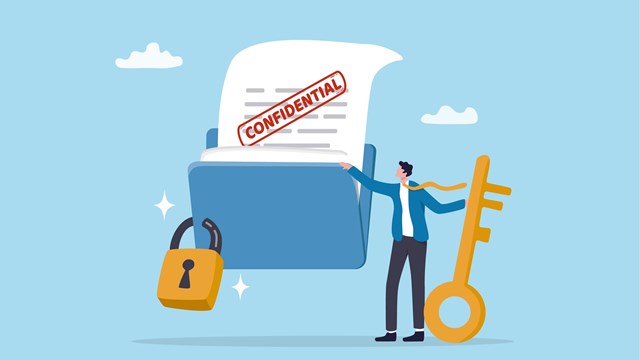
It’s no secret that helping to run a board of directors or board of managers of a co-op or a condo association is quite often a thankless task. There are a lot of issues to take care of, and board members are strictly volunteers. While there might be some unofficial perks for taking the job, one of the core responsibilities that can bog people down is keeping official records. It’s hard enough to produce them, be the ones to read them closely, and make major decisions based on them at board meetings. But, even with the help of a property manager, the storage and guardianship and past records can be confusing and easily overlooked.
Many of us probably don’t put much stock in older records: our receipts from two months ago, or our bills from last year. Individuals more often than not make sure along with their accountant that tax returns are kept somewhere and leave it at that. But, co-ops and condos have quite a bit more to keep track of to keep their noses clean.
“There are all kinds of records that a co-op or condo is going to have. They’ll have corporate records like bylaws, rules and regulations, tax returns, employment records, insurance records, maintenance and service contracts; they’ll have mortgages, alteration agreements. And in a co-op you’ll have purchase applications, shareholder complaints and incident reports—and you’ll have litigation,” says Attorney Andrew P. Brucker, a partner at the law firm of Schechter & Brucker, P.C. in Manhattan.
Figuring out what documents fall under that classification—and what to do with them—can be a cumbersome process. New York State doesn’t have any specific requirements that obligate corporations to retain their documents other than the responsibilities that those records might relate to taxes or lawsuits. “There may be some provisions, but I think notwithstanding what those provisions are, common sense is a more reliable measure of how record retention should be addressed,” says David Brauner, an attorney and counsel at the law firm of Windels Marx Lane & Mittendorf, LLP in Manhattan.
“The most obvious category is tax returns and other tax-relevant records. Generally, the rule of thumb is that you should keep them for about five years after the date of filing of the tax return to which they relate. The statute of limitations for filed tax returns for the IRS to come back at you is three years, but I think it makes sense to add a couple of years as a cushion. Some may tell you seven years; it's really a judgment call,” he says.
Storage Location
The all-important first step is determining what files and records are considered sensitive requiring secure storage. The second equally important step is determining where and in what fashion the documents are to be stored. “Boards change and it's hard to keep things together to somebody's filing drawer in their apartment and these things get lost and not kept up to date, so normally you look to the managing agent to maintain these records in an orderly fashion,” says Barry Mallin, a partner at the law firm of Mallin & Cha, P.C. in Manhattan.
But, for many buildings, the simple matter of finding the space for these files becomes a problem, and one that can also be costly. That’s why electronic files have been more useful, especially as huge amounts of digital memory continue to fit in smaller and smaller computers. On top of the ease of space, electronic files also can act as a backup to the real documents as well. “More and more records are being kept electronically, but certain things like a proprietary lease, you might have to bring into court, and you’ll need the original copy for that,” says Mallin. “These things will evolve over time as we get away from using paper but we’re sort of in a transitional stage right now.”
Electronic filing is a streamlined approach to recordkeeping but for many associations the cost and time involved presents issues. When copies are requested, on an attorney’s advice, files are printed or copied and a minimal charge is levied. While there is a growing movement toward e-based recordkeeping, many associations still rely on hard copies. Still, many property management companies have made a full transition to going completely paperless in how they conduct their business.
Who Can Access Files?
Knowing what documents to file and where they are to be stored are critical to the successful running of a board or an association. Once these two variables in place, there are other considerations such as how long they should be stored and who can access these sensitive files.
There are records that are not accessible by all board members. These include any record protected by lawyer-client privileges, medical records and any other confidential information.
“Prospective purchasers will submit rather detailed and extensive financial documentation, which is frequently circulated among the members of the board so they can review it. I think it's prudent once a decision has been made that those documents as a matter of privacy, be shredded,” says Brauner.
But it’s not just unit owner’s privacy for the sake of protection and courtesy that boards have to worry about when it comes to showing records, legal experts say. Some unit owners might have an agenda, and are looking for evidence in the records. On top of complications to regulations involving debt collection, and indviduals’ rights to privacy in regard to those laws. The best solution to not getting caught in these holes is to make sure the board is doing their job by releasing the appropriate records at meetings to unit owners. Unit owners will have much less of a propensity to get accusatory if the proper records are already available for public view.
Also, an attorney and CPA should be able to help in determining what personal information should be redacted before such records are shown to unit owners.
“Normally under the statute, it spells out things that the shareholders or unit owners have access. Each shareholder is entitled to the names and apartment numbers of the shareholders,” says Mallin. “They’re entitled to annual financial statements and the the minutes of the board meetings. Other than that, there’s not other absolute rights for shareholders to see other records. Usually they have to give a good reason as to why they need to see these records. Other things are certainly confidential. When someone applies for an apartment, they’ll be submitting their financial history and tax returns, and they’ll only be seen by the board members as far as assessing whether or not they should be admitted to the co-op or not. Once they’ve been admitted and part of the building for a year, I don’t see why the board should keep such personal documents beyond a certain period of time,” he says.
Assured Destruction
Boards and managing agents should be aware that ramifications do exist for the improper handling and/or disposal of files. If private information is thrown out but somehow recovered by a third party, the association may be liable. “I think it’s a good idea for every building to have their own shredder because you’re going to have sensitive items in your possession--employment records, applications of shareholders. It’s always good to have a shredder around,” says Brucker.
The benefits of electronic recordkeeping were discussed above, but when it comes to purging and destroying documents that are old enough to bite the dust, electronic files can pose a challenge. “Emails with third parties are subject to subpoena and might be disclosed. For example, if a board member emails something that be dangerous to be heard or seen, that email is discoverable in a lawsuit,” says Brucker. “When it comes to emails, depending on where it was sent to or from, it may be confidential or it may not be. That’s one of the problems. If you email something from your employment, and your employer is the one that has that file server. That’s considered no longer confidential, because your employer could look at it. It’s not a bad idea for board members to create an email address just for board matters. It’s getting common, actually.”
Due to the frequent turnover on most association boards, issues arise when an incoming president, for example, is seeking files from the outgoing president. In many cases, there might have been an ousting and perhaps the transition is considered hostile. The same can happen with property management companies. A board might have a falling out with one company, and the succeeding management firm has to pull teeth to get the departing company to hand over all the appropriate files. “When it’s time for a change in management, there may be a couple of management companies, who are pretty upset when they lose you as a client, and they are very difficult to deal with. They don’t turn over documents or money that quickly. In a lot of cases, we’ve seen boards that say they make copies of everything,” says Brucker.
For new board members, or if questions arise from seasoned members, look to organizations like the Federation of New York Housing Cooperatives and Condominiums (FNYHC), the Council of New York Cooperatives and Condominiums (CNYC), the New York Association of Realty Managers (NYARM), and the Community Associations Institute (www.caionline.com), which has a Long Island chapter at www.cai-li.org. All of these organizations have information to guide boards and management companies about document-related issues. Some of these organizations offer excellent advice on how best to store your files.
W.B. King is a freelance writer and a frequent contributor to The Cooperator. Editorial Assistant Tom Lisi contributed to this article.









Comments
Leave a Comment